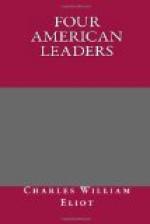The silent Washington’s antipathy to the press finds an exact parallel in our own day. He called the writers of the press “infamous scribblers.” President Cleveland called them “ghouls.” But it must be confessed that the newspapers of Washington’s time surpassed those of the present day in violence of language, and in lack of prophetic insight and just appreciation of men and events. When Washington retired from the Presidency the Aurora said, “If ever a Nation was debauched by a man, the American Nation has been debauched by Washington.”
Some of the weaknesses or errors of the Congresses of Washington’s time have been repeated in our own day, and seem as natural to us as they doubtless seemed to the men of 1776 and 1796. Thus, the Continental Congress incurred all the evils of a depreciated currency with the same blindness which afflicted the Congress of the Southern Confederacy and the Union Congress during the Civil War, or the Democrat-Populist party of still more recent times. The refusal of the Congress of 1777 to carry out the agreement made with the Hessian prisoners at Saratoga reminds one of the refusal of Congress, in spite of the public exhortations of our present Executive, and his cabinet, to carry out the understanding with Cuba in regard to the commercial relations of the island with the United States. In both cases the honor of the country was tarnished.
The intensity of party spirit in Washington’s time closely resembles that of our own day, but was certainly fiercer than it is now, the reason being that the questions at issue were absolutely fundamental. When the question was whether the Constitution of the United States was a sure defence for freedom or a trap to ensnare an unsuspecting people, intensity of feeling on both sides was well-nigh inevitable. During Washington’s two administrations a considerable number of the most eminent American publicists feared that dangerous autocratic powers had been conferred on the President by the Constitution. Washington held that there was no ground for these fears, and acted as if the supposition was absurd. When the question was whether we should love and adhere to revolutionary France, or rather become partisans of Great Britain—the power from which we had just won independence—it is no wonder that political passions burnt fiercely. On this question Washington stood between the opposing parties, and often commended himself to neither. In spite of the tremendous partisan heat of the times, Washington, through both his administrations, made appointments to public office from both parties indifferently. He appointed some well-known Tories and many Democrats. He insisted only on fitness as regards character, ability, and experience, and preferred persons, of whatever party, who had already proved their capacity in business or the professions, or in legislative or administrative offices. It is a striking fact that Washington is the only one of the Presidents of




